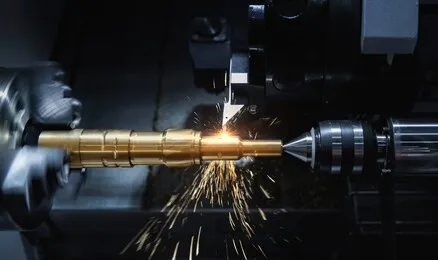The CNC machining industry is an ever-evolving sector that has seen significant changes in the last few decades. For instance, advancements in artificial intelligence (AI) have allowed for greater precision and automation of production processes, resulting in improved efficiency and accuracy. AI provides a unique opportunity to optimize CNC machining operations by automating repeatable tasks and more effectively managing complex projects. It can also enable faster prototyping and reduce costs associated with manual labor involved in many parts of the process. AI technologies can automate a wide range of processes and operations that were traditionally done manually. This automation provides increased efficiency and accuracy, which in turn improves product quality and reduces production costs.

CNC machines are computer-controlled cutting tools used to shape a variety of materials. AI is used to automate the programming and operation of these machines, allowing them to work faster and more accurately than manual operators. AI-assisted CNC machining can be used for a wide range of operations such as drilling, cutting, grinding, polishing, and engraving.
One recent example of this is the development of AI-powered machining centers that can optimize their own operations based on data analysis. These centers can monitor their own performance and make adjustments in real time, reducing the need for human intervention and minimizing downtime.
Another area where AI is making a difference in CNC machining is in predictive maintenance. AI also helps reduce downtime due to machine failure. AI systems can detect if a CNC machine is malfunctioning and take corrective action, reducing the time needed for repairs and maintenance.
In addition, AI is being used to optimize tool paths for CNC machining. By analyzing data on the material being machined and the capabilities of the machine, AI algorithms can identify the most efficient tool paths to reduce waste and improve productivity. AI-assisted CNC machining also makes it easier to manufacture complex parts with tight tolerances at high speeds, resulting in higher productivity and cost savings.
While AI is bringing many benefits to the CNC machining industry, it is also raising concerns about the role of human workers in the future. As machines become more autonomous and intelligent, there is a risk that jobs in the industry may be displaced.
However, industry experts suggest that rather than replacing human workers, AI technology is likely to create new opportunities in CNC machining. For example, workers with experience in programming and data analysis will be in high demand to develop and maintain the AI systems used in CNC machining.
In conclusion, artificial intelligence is having a major impact on CNC machining operations. Its ability to automate tasks, optimize cutting performance, and monitor conditions makes it a powerful tool for increased accuracy and efficiency while reducing costs associated with manual labor. As the technology continues to evolve, it's likely that its use in CNC machining will only continue to grow – allowing manufacturers to stay competitive in today's fast-paced market. However, it is important to consider any safety and data privacy concerns associated with implementing new technologies before making any major changes. With careful consideration, AI can be a vital asset for CNC machining operations looking to stay ahead of the competition.